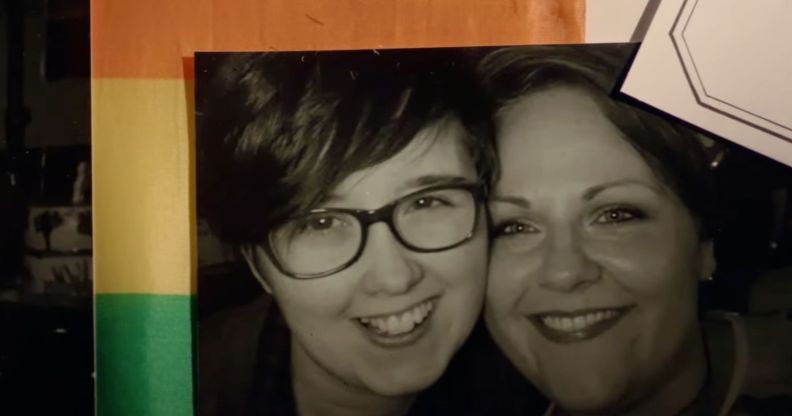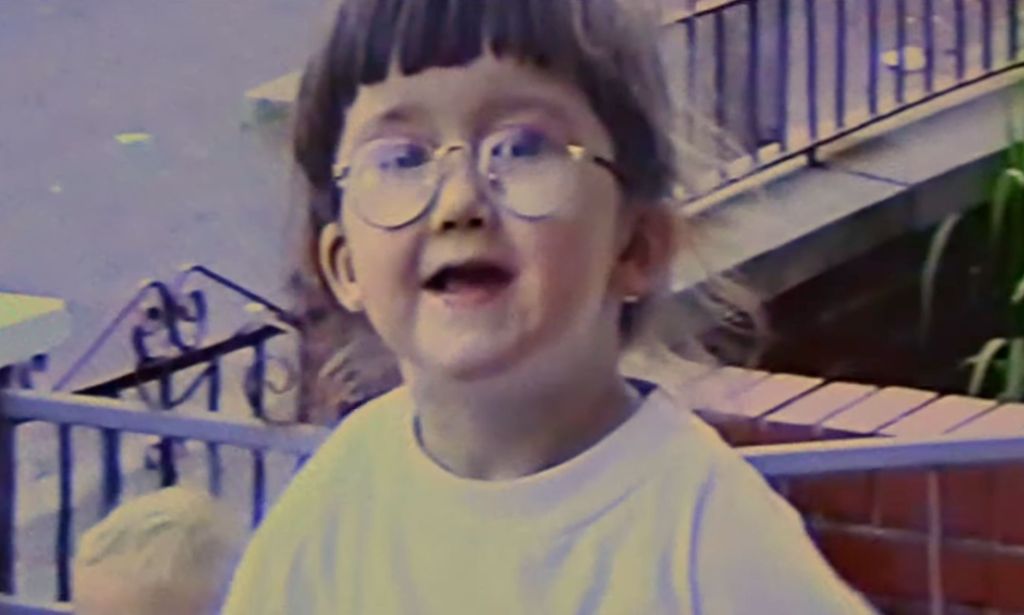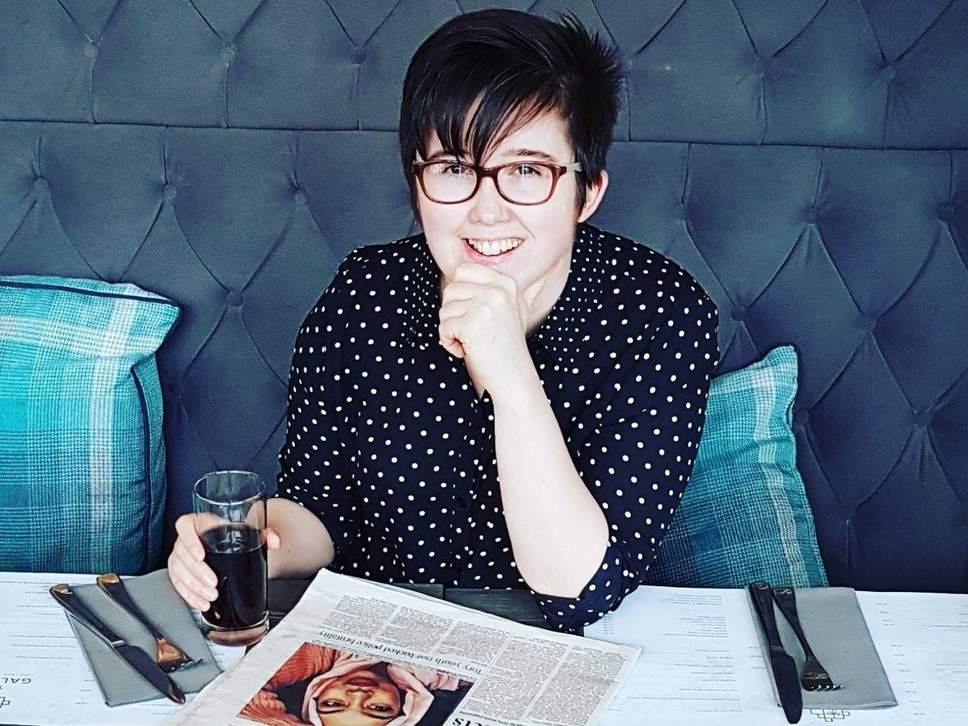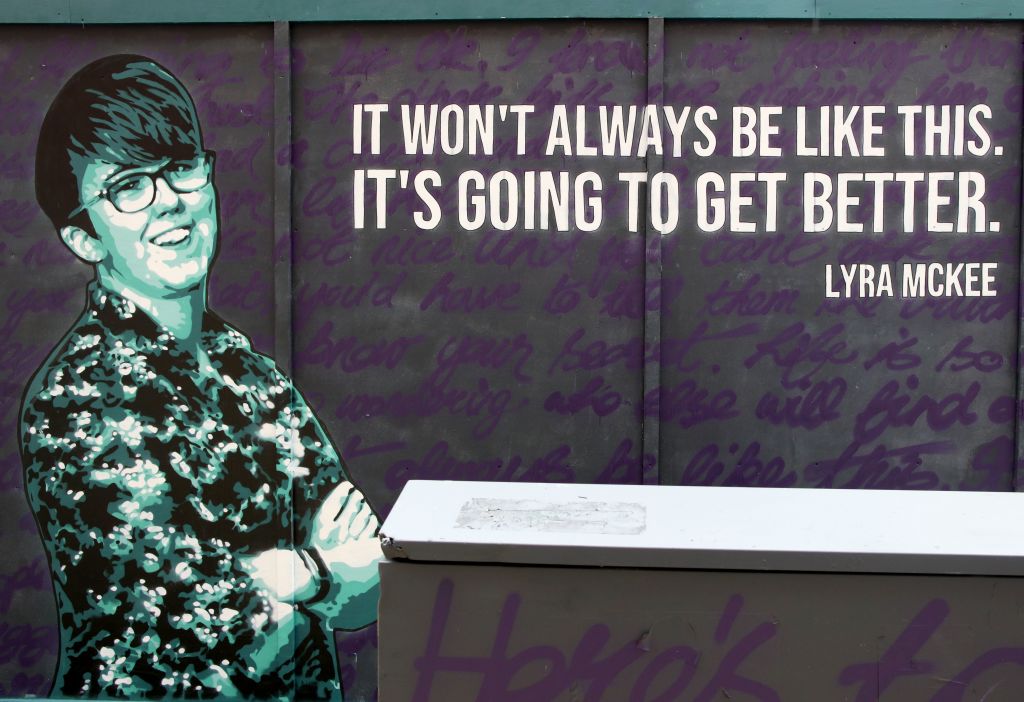The real Lyra McKee: Murdered queer journalist’s partner and friend tell her extraordinary story

Happier times: Lyra McKee and Sara Canning. (Channel 4/Erica Starling Productions)
In April 2019, investigative journalist Lyra McKee was at the top of her game.
She had landed a book deal with Faber and Faber and she was getting ready for a trip to New York where she planned to propose to her girlfriend Sara Canning.
And then, in an instant, her life was snuffed out. As she stood watching riots unfold in Derry, Lyra was shot. She was rushed to hospital, but it was already too late. Lyra McKee was dead.
Her extraordinary story plays out in the documentary Lyra. Directed by Lyra’s close friend Alison Millar, it’s a powerful, moving portrait of a woman who refused to let injustices go and who yearned for a better society. It shows just how vital her voice was – and what a tremendous loss she was, both to wider society and those who loved her.
Reflecting on Lyra’s life shortly after the documentary’s release, Sara and Alison remember her as a deeply passionate journalist whose anxiety often threatened to engulf her.
“She was so smart and she knew so many people; she had her finger on the pulse of Northern Irish politics, of the seedy underbelly of Northern Ireland,” Sara tells PinkNews.

“She was friends with so many people who you would be completely amazed she could be friends with, but equally she was the most naive, sometimes innocent person on the planet.”
‘Anxious’ Lyra McKee battled with self-confidence
In her work, or when speaking on stage, Lyra McKee came across as somebody who was deeply self-assured, but Sara says that wasn’t the full picture. The documentary explores the extraordinary work she did, which shone a light into crevices nobody else was willing to look into – but it also shows how her anxiety loomed in the background.
“When you saw her on stage, when you heard her talking about her career, when she came to you with an idea, she was so sure-headed. She had done her research, which she was amazing at,” Sara says.
“But in the moments where she was planning something or something came to her and she wasn’t quite sure, her self-confidence was zero.”
Alison echoes that. She first met Lyra when she was just a teenager, and they built a long-lasting friendship that spanned over a decade.
“She was very anxious,” Alison says. “We’re both very similar in a way. I could see when they met that Sara was such a wonderful, grounding person to creatively inspire her but also great for her because she’d be like, ‘Oh no, I don’t think I should do this,’ and [Sara] would be like, ‘Do it! Follow your instincts.’”

Sara didn’t need any convincing when Lyra first messaged her on a dating website – she had read “Letter to my 14-year-old self”, a moving piece Lyra had written about her experience of growing up gay in Northern Ireland.
“I was like, ‘My God, this person, she’s young, she’s from here, she’s so switched on, she’s gay, this is amazing, it’s so good to see.’ And I kind of thought that she’d be out of here in no time because that’s normally what happens to the best talent in Ireland and Northern Ireland – they disappear.”
It wasn’t long before Sara and Lyra met in person, and the connection was instant.
“We started talking straight away and we didn’t stop. We just didn’t shut up for 13 months.”
Shortly before Lyra and Sara moved in together, they had to sit down and confront Lyra’s anxiety once and for all.
“Her anxiety was pretty intense,” Sara says. “We kind of came to a crux point where she had gotten so bad with it just prior to moving in with me, maybe three or four months before it, and we sat down and we had a really big discussion about how she needed to go and seek help for it.”
Lyra was very empathetic and she took on other people’s issues.
Lyra McKee’s extraordinary capacity for empathy was what drove her in her work, but it was also what caused her anxiety.

“Lyra was very empathetic and she took on other people’s issues. She had a couple of friends who were going through breakups and things like that and she was taking it all on as if it was our issue and I was like, ‘This isn’t our issue, this is their issue. We’re not going through that, we’re fine, but you worrying about it and making such a big deal all the time is going to cause an issue. You need to sort this out.’”
Together, Lyra and Sara decided they were going to work on themselves and on their own separate issues. Lyra went on antidepressants and was referred to a counsellor.
“That worked,” Alison reflects. “We put that bit in the film about her suffering from anxiety because I know quite a lot of people who are in that position too. She was writing amazing stuff and sending it off saying, what do you think? And then she was pulling herself down before it even went to the editor.”
Lyra was getting her anxiety under control, her career was blossoming, and her relationship with Sara was going from strength to strength. And then came that devastating night in Derry.
In the weeks after Lyra’s death, requests started to roll in from journalists and production companies who wanted to tell her story.
Her family and loved ones weren’t convinced. They were afraid somebody would swoop in and say they were making a documentary about Lyra, but would end up making a film about the New IRA.
That’s when the discussion started with Alison.
“I think when this happened I just was kind of like, ‘I don’t really know how to do this because it’s a very, very hard one. Will it ever be good enough?’ I was a bit fraught about it all,” Alison says.
In the end, in the face of “pressure” from Lyra’s family, she acquiesced. Just weeks after the shooting, Alison accompanied Lyra’s mother and sister Nichola to London where they accepted an award on Lyra’s behalf. It became the first sequence Alison filmed for the documentary – even though she didn’t know for sure yet if she was up to the task.
The resulting film is about Lyra, but it’s also about The Troubles. The two are inseparable, in large part because of the work Lyra did.
“Obviously this film is about The Troubles, but it’s about a continuing theme of people not speaking up, people being beaten down, held hostage by the circumstances here,” Sara explains.
“It’s all the stuff that Lyra wrote about, whereas [somebody else] would have just made a film about the New IRA. It would have been the sensation of everything that happened after Lyra was murdered.”
Documentary shows the real ‘everyday person’ Lyra Mcee was
When Alison and Sara sat down to watch Lyra for the first time, it hit them hard. It took Sara around three weeks to recover.
“There are parts of it I can’t really watch too much at the beginning, because I hate watching that night, and I hate watching the funeral, but I can watch all the rest of it and I love it. It just makes me smile because she’s there and she’s alive, it’s like she’s back in the room.
“Ali’s captured the way Lyra spoke. It wasn’t like her TED talk voice where she had to speak very carefully and she couldn’t really do her full-on Belfast accent. It was Lyra as an everyday person.”
Both Alison and Sara hope people will come away from Lyra’s story with a newfound sense of hope about what they can achieve. Lyra was a working-class woman who ascended through the ranks of a media that’s notoriously hard to break into, they hope people draw inspiration from that.
“Her life shows you you can do it. She didn’t grow up and go to Eton,” Alison says.
“She didn’t go to university,” Sara adds. “She didn’t have a degree backing her up. This is somebody who was self-made.”
Lyra McKee briefly attended university in Birmingham, but she ultimately dropped out because she couldn’t afford to complete the programme. She was later given the degree posthumously.
“It just shows you that you don’t always need to follow that set path,” Sara says.
For LGBTQ+ people, Sara hopes Lyra’s life will remind them to focus on what unites rather than what divides.
She was proud of the fact that as a young gay woman she was succeeding in a world that was usually dominated by straights – men, more often than not.
“Our community can be very divided sometimes, especially at the moment. Lyra was a really strong supporter of all of the people under the LGBTIA+ banner and umbrella. We all have to support each other, there’s no one without the other.”
Sara says Lyra sometimes felt “ostracised” by the LGBTQ+ community; a falling out with a friend meant she was “put out to the side” during her lifetime. Despite that, she was “always proud of being a gay woman”.
“She was proud of the fact that as a young gay woman she was succeeding in a world that was usually dominated by straights – men, more often than not. She was coming up with a lot fewer letters after her name than a lot of other people who were doing the exact same work as her and getting a hell of a lot further.”
She adds: “I think it’s about being proud of who you are. Be proud of your identity, celebrate it, and don’t forget what got you as far as you’ve gotten.”
For her part, Alison hopes Lyra will immortalise a woman whose life should never have been taken in the first place – and whose work remains vital even in death.
“This incredible woman and her voice will remain. We are going to make damn sure that more people know of her and her work and know the force of good she was – not the force of bad that took her away.”
Lyra, directed by Alison Millar, will be screened on Channel 4 in 2023. A US release is also planned.

